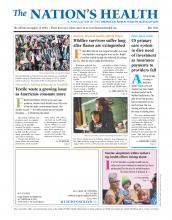
A working group spent a year creating and developing principles of ethics involving AI health marketing programs.
Photo by GamePH, courtesy iStockphoto
Whether it is drafting a social media post or rephrasing messages into simpler language, more communications professionals are using artificial intelligence technology in their work. A new guide is designed to help public health professionals responsibly use AI in their public communications.
“The Ethical Use of AI in Public Health Communication,” a working paper from the National Public Health Information Coalition and Discourse Labs, shares guidelines public health communicators can use to make sure their AI use aligns with credible and trustworthy public health messaging.
“Our guidelines could not just reflect something that someone else built,” NPHIC executive director Robert Jennings told The Nation’s Health. “We had to look at our core mission in public health and then decide what guidelines are reflective…of protecting and improving health.”
A working group spent a year coming up with principles of ethical AI use, which professionals can use as a checklist for their work. The principles include protecting the public, building credibility through accuracy, centering human judgment, advancing the health of all communities and iterating responsibly.
Because AI tools can scrape data from different sources across the internet, it is important for public health practitioners to remain responsible and accountable for interpreting any health insights, said Khalilah LeGrand, EdD, a working group member and vice president of communications and public relations for the Association of State and Territorial Health Officials.
For the principle of centering human judgment, for example, the checklist asks users to confirm their AI-generated content is appropriately and accurately cited, as AI can sometimes create citations that do not exist.
“AI should not replace human expertise,” LeGrand told The Nation’s Health. “It is an aid. It is an assistant. These ethical guidelines can help clarify accountability for AI-driven decisions or AI-driven products that help us make decisions.”
Glen Nowak, PhD, MA, a working group member, teaches a graduate level course on risk communication at the University of Georgia’s Grady College of Journalism and Mass Communication and has spent several years focusing on the use of artificial intelligence in health communications. He said the guidelines will be helpful for students to illustrate differences in AI software, but also the difference between public health and commercial health communications.
“If you’re in public health, you have to be mindful that you need to establish and build trust with different groups of people,” Nowak told The Nation’s Health. “You need to make sure that you’re protecting personal information involving health and medical conditions.”
There are also many parallels between the guidelines and the core values in APHA’s Code of Ethics, according to Cee Ann Davis, MD, MPH, chair of the APHA Ethics Section’s Policy Committee. For example, the working paper’s principle of advancing the health of all communities aligns with the value of health justice and equity, while the principle of building credibility through accuracy aligns with the values of professionalism and trust.
“Professionalism and trust includes people who are adequately trained to use AI in public health messaging,” Davis told The Nation’s Health. “It includes people who are adequately trained in internet safety, and in…protection of personal information.”
The AI working paper is the first edition and will evolve as AI technology evolves, Jennings said. In the meantime, the paper offers a policy guide template that health agencies can adopt and modify based on their communications needs, as well as sample disclaimers for websites to display about AI-generated content. As the working paper is shared at conferences, webinars, and public health networks among working group members, Jennings said he looks forward to feedback on how to improve.
“That’s something we missed out on in the adoption of social media in public health, but we have this new opportunity to be on the forefront of this technology,” Jennings said.
For more information, visit www.discourselabs.org/ai-ethics-public-health.
- Copyright The Nation’s Health, American Public Health Association









